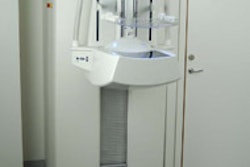The American College of Radiology has gained a big supporter in its efforts to influence the practice of medicine in the U.S. For the first time, a major insurer is planning to adopt and promote both the ACR's accreditation programs and its imaging selection criteria.
UnitedHealthcare of Minneapolis, currently the nation's largest health insurer covering more than 20 million individuals across the U.S., has already begun pilot-testing its initiatives in what will likely be a multiyear, escalating phase-in.
For example, the company has just sent questionnaires to imaging providers in North Carolina, Colorado, and Texas, to determine their ACR-accreditation status. The ACR-accredited facilities will then be singled out for their "Excellence in Radiology" in future UnitedHealthcare provider directories.
While no providers will be dropped for failing to achieve ACR accreditation, UnitedHealthcare expects to drive more referrals and patients to accredited facilities.
"We know that we can be successful in steering people to the best," said UnitedHealthcare senior vice president Dr. Reed Tuckson, citing the company's earlier designations of cardiac and oncology centers of excellence.
The insurer's plan also calls for disseminating the ACR Appropriateness Criteria to nearly 450,000 physicians around the country -- undoubtedly a much larger audience than has previously seen the criteria.
The appropriateness criteria give the ACR's official recommendations on which imaging options should be used in more than 190 clinical scenarios. The criteria were developed through the consensus of expert panels that looked at the available literature.
UnitedHealthcare will start by promoting just a fraction of the 190-plus criteria, focusing primarily on oncology and musculoskeletal imaging.
"We really hope we're leading a parade here, of many other (insurers), focusing in on the ACR guidance and expertise in these matters," Tuckson said. "What we ultimately hope is that the radiologist would experience more appropriate requests for studies."
The ACR also sees the free use of its criteria as a way to curb overutilization, which could otherwise lead to cuts in reimbursement, said ACR chairman Dr. James Borgstede.
"What we get (from the UnitedHealthcare arrangement) is the preservation of appropriate imaging and the recognition of our appropriateness criteria," Borgstede said.
"Imaging utilization is going to be controlled in one fashion or another by the carriers, and we would like to be a player there," Borgstede stated. "That's the opportunity we've had with UnitedHealthcare, and why I'm so excited about it."
UnitedHealthcare, like other insurers, has been struck by the escalation in imaging utilization and expenditures in recent years, Tuckson noted.
While other insurers have looked at the ACR accreditation and appropriateness criteria in developing their own rules, UnitedHealthcare is the first to adopt the ACR's findings wholesale and to use the college's name on them as well.
Yet unlike insurers such as Highmark Blue Cross Blue Shield of Pennsylvania, which has announced plans to cull its imaging network and require preauthorization of certain exams, UnitedHealthcare is pursuing a softer approach.
Implementation of the appropriateness criteria won't involve preauthorizations or denials of payment, Tuckson said. Instead, the company plans to influence imaging use through a variety of communications with referring physicians.
But self-referral of imaging isn't an issue that UnitedHealthcare plans to address per se, Tuckson said.
"What we believe, in this case, is 'Let's have the best criteria that define whether a particular test is appropriate to be done and should be done, and really rachet down on a science- and evidence-based analysis of performance,'" he said. "I think if we do that, it doesn't much matter to us, at this point, the dynamics of ownership of the machine."
"What we are really seeing is an extraordinary need for leadership from the profession itself in improving evidence-based clinical practice," Tuckson concluded. "The ACR deserves to be commended for willingness to take a leadership role, and we're excited to facilitate their leadership in improving clinical care, which is, from our perspective, the way it ought to be."
By Tracie L. Thompson
AuntMinnie.com staff writer
December 9, 2004
Related Reading
Radiologists (mostly) cheer as insurers set imaging rules, November 4, 2004
Health insurers see new role managing information, April 7, 2004
Imaging by non-radiologists drives up healthcare costs, November 25, 2002
HOPPS won't improve without feedback from radiologists, September 12, 2002
Copyright © 2004 AuntMinnie.com



















